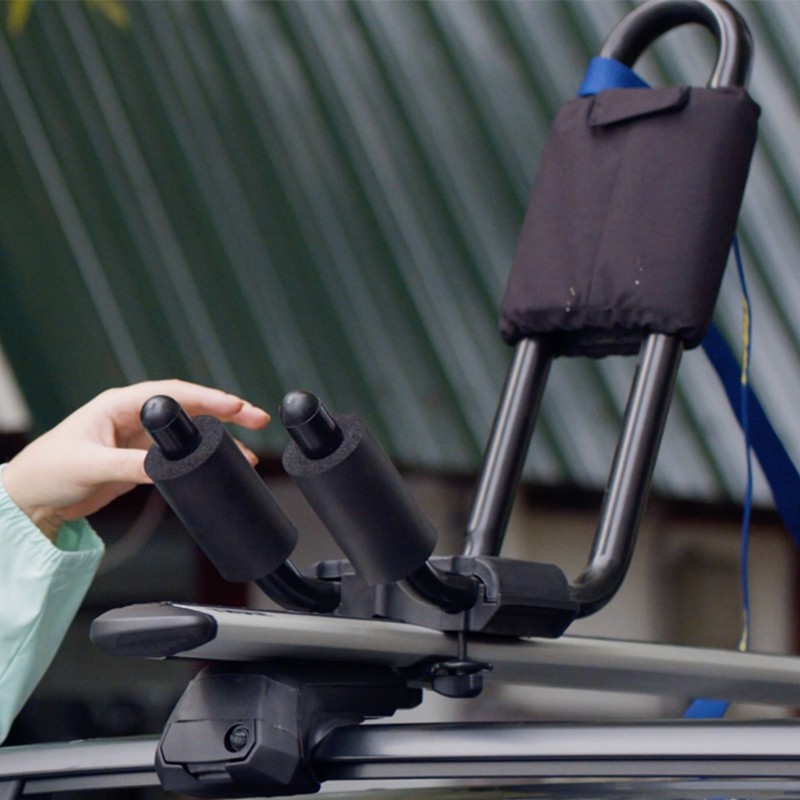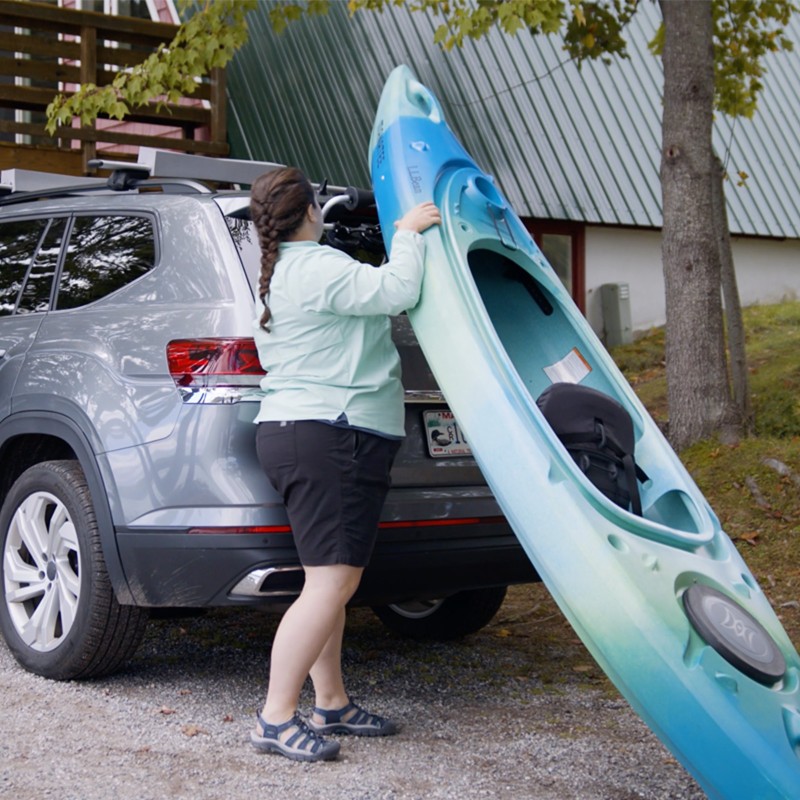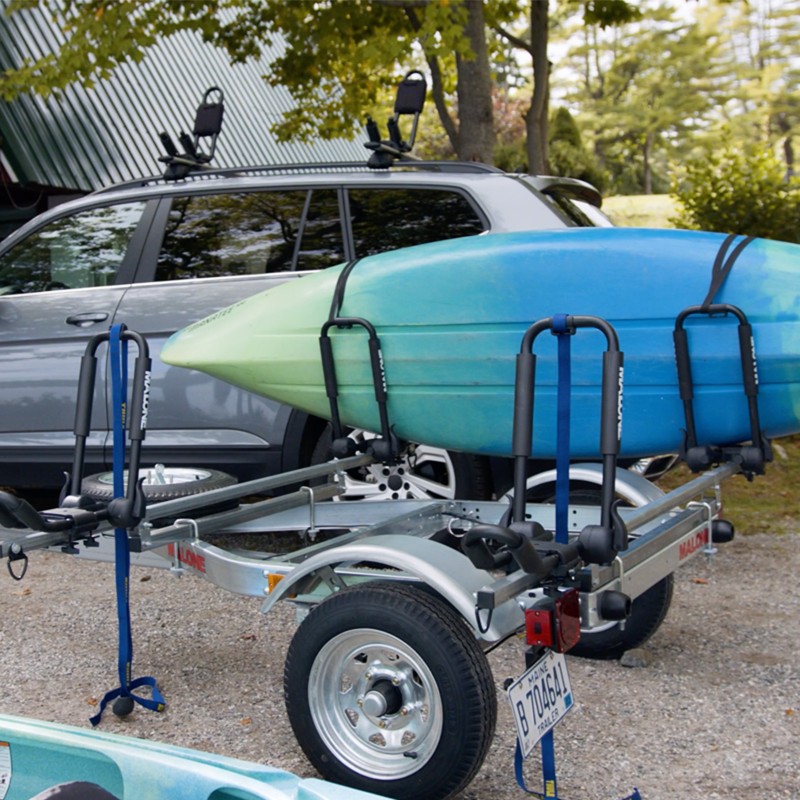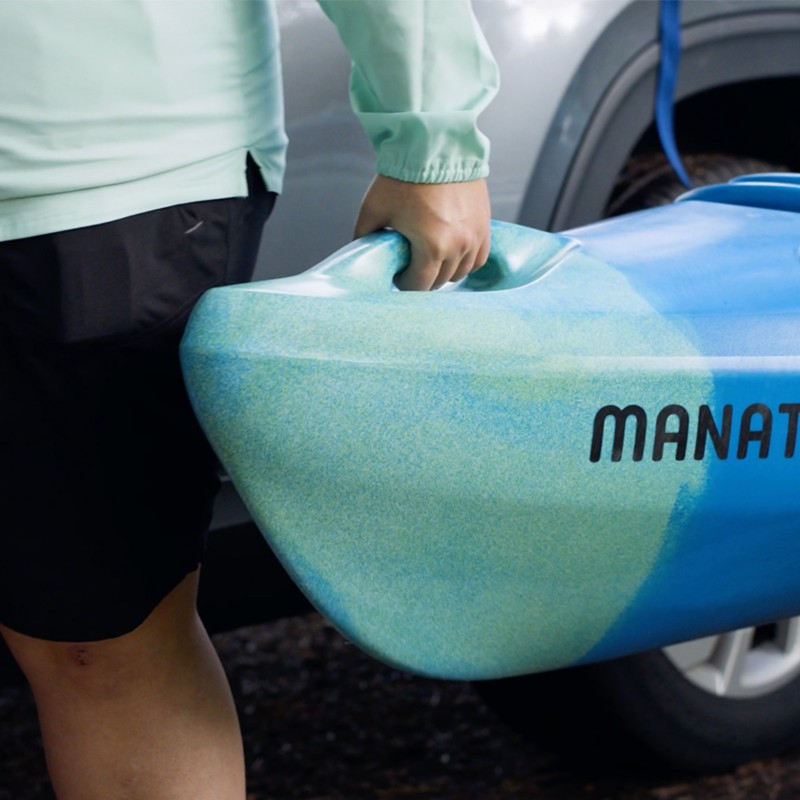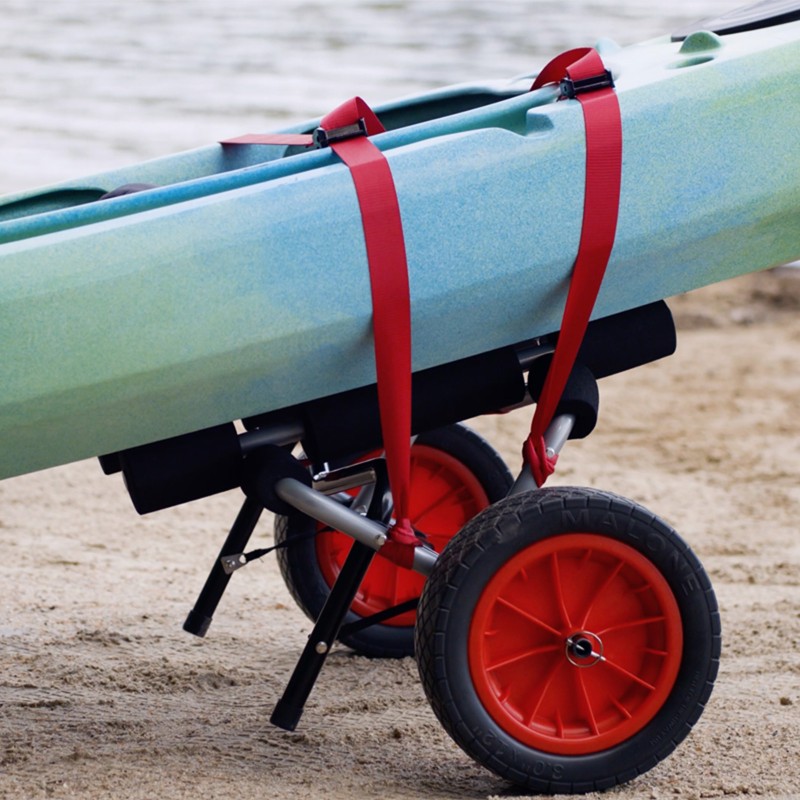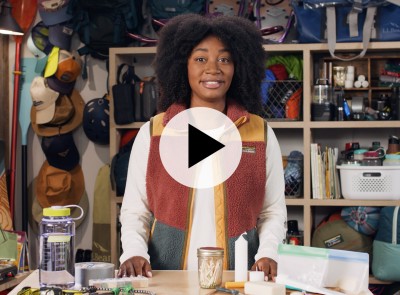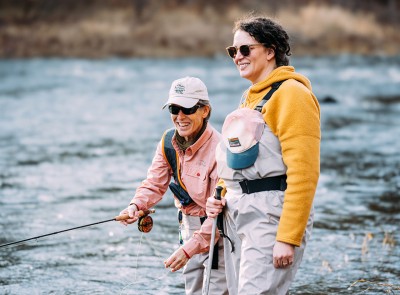(DESCRIPTION)
[00:00:00.00] A car drives along a country highway surrounded by colorful trees. The car has a green kayak on the roof. Text, L L Bean, How to transport your kayak. Mackenzie, Captain of kayak carrying.
(SPEECH)
[00:00:00.48] [MUSIC PLAYING]
[00:00:04.35] Mackenzie here. You've got this brand new, shiny, beautiful kayak.
(DESCRIPTION)
[00:00:08.31] She stands in front of the S U V with the green kayak on top.
(SPEECH)
[00:00:08.58] Now you just have to figure out how to get it from your house to the water. So we're going to go over some quick and easy tips on how to transport your kayak using your car and getting it from your car to the water safely and quickly. Let's get into it.
[00:00:21.11] [MUSIC PLAYING]
(DESCRIPTION)
[00:00:21.85] Text, Using a Roof Rack.
(SPEECH)
[00:00:22.99] Let's start by getting your kayak onto your car. For this video, we're using the type of roof rack that you buy and install. What's great about these is that they're made specifically for kayaks.
(DESCRIPTION)
[00:00:32.10] Tip, These racks come with fit kits made specifically for your vehicle.
(SPEECH)
[00:00:32.46] They cost a bit more, but they're the easiest and most secure way to transport your kayak on top of your car.
(DESCRIPTION)
[00:00:37.69] She and a friend load the kayak onto the car. Text, Loading with a friend onto J-style Kayak Car.
(SPEECH)
[00:00:37.92] You can load the boat alone. But having a friend to help is always nice. Luckily, I have my friend, Liz.
(DESCRIPTION)
[00:00:44.40] Liz walks over.
(SPEECH)
[00:00:45.18] Hi Liz.
[00:00:45.77] Hi Mackenzie.
[00:00:46.68] How are you?
[00:00:47.47] I'm great.
[00:00:48.00] Ready?
[00:00:48.34] I'm ready.
[00:00:49.02] Let's do it.
[00:00:49.41] Let's do it.
[00:00:50.28] [GRAVEL CRUNCHES UNDER FEET]
(DESCRIPTION)
[00:00:50.50] They crouch down and bend their knees to lift. Text, tip, always lift with your legs to avoid straining your back.
[00:00:57.13] The driver side door is open, and Mackenzie stands with one foot on the frame of the car and the other on the door. They lift the kayak up, turn it on its side, and slip it into the rack.
(SPEECH)
[00:01:02.84] Perfect.
[00:01:04.00] Nice.
[00:01:04.74] [SLAPS HANDS]
(DESCRIPTION)
[00:01:04.74] They give each other a high five.
(SPEECH)
[00:01:05.72] Follow the carrier manufacturer's instructions to secure the kayak with straps.
(DESCRIPTION)
[00:01:09.87] She tightens the straps.
(SPEECH)
[00:01:10.76] One important note, it's fine to load your boat directly onto the racks if it's made from polyethylene, otherwise known as plastic, which is most recreational kayaks. But it's a good idea to use foam blocks that attach to the load bars to protect the kayak.
(DESCRIPTION)
[00:01:25.45] White foam blocks hold the kayak off the load bars. Text, Loading by Yourself. Mackenzie looks around.
(SPEECH)
[00:01:26.60] Liz? Liz? Heh. If you're on your own, don't worry. Here's an easy way to get the boat up on the car by yourself. We recommend using assistance like a roller loader that attaches to the rear load bar. Be sure to follow the manufacturer's instructions for installing and loading all racks and carriers for your kayak.
(DESCRIPTION)
[00:01:46.71] She lifts one end of the kayak. Text, Rest the Bow on the Roller.
(SPEECH)
[00:01:47.42] Place the boat behind the car and lift the bow, the front of the boat, up so it's resting on the roller. Now pick up the stern or the back and simply slide the kayak up and onto the racks. Secure the kayak to the racks with straps.
(DESCRIPTION)
[00:02:02.33] She tightens the straps.
(SPEECH)
[00:02:02.78] Tie-down straps with cam buckles make it super easy. Secure your kayak using the rack and kayak manufacturer's instructions.
(DESCRIPTION)
[00:02:09.75] She looks at the instructions.
(SPEECH)
[00:02:10.22] Regardless of what type of boat is being loaded on the roof rack, bow and stern lines should always be used when transporting a boat on the roof of a vehicle.
(DESCRIPTION)
[00:02:18.42] She attaches the lines to the front and back of the car and tests that they are secure by pulling on them.
(SPEECH)
[00:02:19.04] All right.
(DESCRIPTION)
[00:02:19.67] She holds up the roller.
(SPEECH)
[00:02:20.45] If you're going to be doing this a lot on your own, it's a good idea to invest in accessories like this that will make it easier and safer.
(DESCRIPTION)
[00:02:26.77] A trailer with two kayaks on it. Text, Using a Trailer.
(SPEECH)
[00:02:27.62] Using a kayak trailer is a great way to move your kayak around. They're light, easy to use, and they can be towed by just about any vehicle with a hitch.
[00:02:35.99] Best of all, you don't have to lift your boat high to get it on the roof rack. Just like a car roof rack, you can load it with a friend, like Liz, or by yourself.
(DESCRIPTION)
[00:02:45.05] She easily lifts it onto the trailer by herself. Text, Tip, your car needs to be equipped with a trailer hitch to tow a trailer.
(SPEECH)
[00:02:45.44] To properly attach the trailer and load your kayak, please follow all manufacturer's instructions.
[00:02:51.20] [MUSIC PLAYING]
(DESCRIPTION)
[00:02:51.23] She drives up to a lake. Text, Getting your Kayak to and from the Water.
(SPEECH)
[00:02:54.12] Now all you've got to do is get your boat to the water.
(DESCRIPTION)
[00:02:57.21] Carrying by Hand. She and Liz lift the kayak down from the car rack.
(SPEECH)
[00:02:57.57] Like loading onto your car, carrying it to the water is easiest if you have a friend. Most boats have bow and stern grab handles, making it easy for two people to carry the kayak.
(DESCRIPTION)
[00:03:07.11] Now she demonstrates using the roller attachment to roll the kayak down off the top of the car.
(SPEECH)
[00:03:07.98] If you're alone, get it off the rack by reversing the steps you use to load it. You can carry it like a briefcase by holding onto the inside of the cockpit coaming.
(DESCRIPTION)
[00:03:16.43] Text, Tip, if the coaming is not padded, use a towel or jacket for padding.
(SPEECH)
[00:03:16.62] Or you could lift it so the padded coaming of the cockpit is resting on your shoulder.
[00:03:21.27] [MUSIC PLAYING]
(DESCRIPTION)
[00:03:21.27] Now she wheels her boat to the water on a cart. Text, Using a Boat Cart.
(SPEECH)
[00:03:22.59] A boat cart is the easiest way to move your kayak around by yourself. You can quickly attach one to the stern of your kayak using the included straps.
(DESCRIPTION)
[00:03:30.15] Tip, Make sure the kayak is centered and securely attached to the cart or it could come loose on rough terrain. Follow all manufacturer's instructions.
(SPEECH)
[00:03:30.51] They have two wheels, so all you have to do is lift up the bow with the grab handle and roll it to the water.
(DESCRIPTION)
[00:03:36.59] She rolls the kayak over sand to a lake.
(SPEECH)
[00:03:38.01] Oh, one last tip, always wear your PFD when you're in the kayak or around the water.
(DESCRIPTION)
[00:03:44.23] She puts on a life jacket.
(SPEECH)
[00:03:45.27] [ZIPPER ZIPS]
[00:03:46.65] Now you're ready to bring your kayak anywhere for some paddling fun. For more kayaking how-to videos, visit our Get Outside Guide at llbean.com, and I'll see you on the water.
(DESCRIPTION)
[00:03:56.46] Text, For more ways to make getting outside easy, visit l l bean dot com slash outside.
(SPEECH)
[00:03:58.02] If you're interested in kayak classes, trips, or tours near you, check out our Outdoor Discovery Programs at llbeanoutdoors.com.
(DESCRIPTION)
[00:04:06.06] We see the kayak strapped to the top of the car, outlined against a blue sky, as the car makes its way along a road. Text, Don't forget to like, comment, and subscribe for more how to's.
(SPEECH)
[00:04:06.48] [MUSIC PLAYING]
[00:04:07.98]




